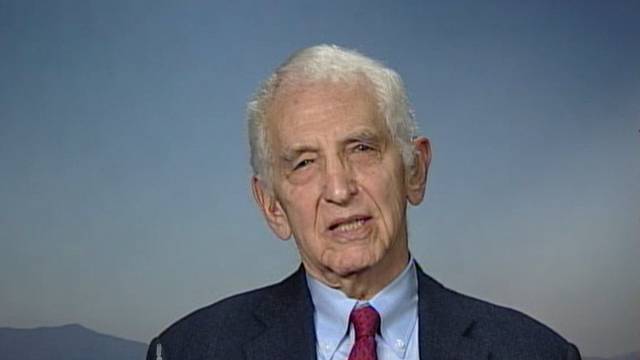
An Interview With Daniel Ellsberg
Amy Goodman / Democracy Now!
(May 1, 2023) — Today we spend the hour with Pentagon Papers whistleblower Daniel Ellsberg, who recently announced that he has been diagnosed with inoperable pancreatic cancer with only months left to live. Ellsberg, who turned 92 on April 7, may be the world’s most famous whistleblower.
In 1971, The New York Times began publishing excerpts of the Pentagon Papers — 7,000 pages of top-secret documents outlining the secret history of the Vietnam War. The Times exposé was based on documents secretly photocopied by Ellsberg and Anthony Russo while they worked as Pentagon consultants at the RAND Corporation.
The leak ultimately helped to take down President Nixon, turn public sentiment against the War in Vietnam and lead to a major victory for press freedom. The Nixon administration went to extraordinary lengths to silence and punish Ellsberg, including breaking into his psychiatrist’s office. But the government’s misconduct led to charges against him and Russo being dismissed.
Over the past five decades, Ellsberg has remained a leading critic of U.S. militarism and U.S. nuclear weapons policy, as well as a prominent advocate for other whistleblowers. “Why in the world are we in this position, time after time, of fighting against the self-determination or the nationalism of other countries, and taking on those murderous tasks as opposed to dealing with problems at home?” says Ellsberg in an in-depth interview with Democracy Now! A rush transcript is available here and here. The interview is in two parts below:
As we continue our in-depth conversation with Daniel Ellsberg, the famed Pentagon Papers whistleblower talks about his lifelong antiwar activism and responds to the more recent leak of Pentagon documents about the war in Ukraine.
Ellsberg also reflects on the many people who inspired him and says others who look up to his example should know that the sacrifices for building a better world are worth it.
“It can work,” he says. Ellsberg, who was recently diagnosed with inoperable pancreatic cancer and given just months to live, spoke to Democracy Now! last week from his home in Berkeley, California.